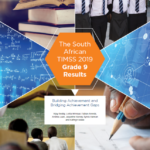The South African TIMSS 2019 Grade 9 Results
Building Achievement and Bridging Achievement Gaps

The Trends in International Mathematics and Science Study (TIMSS) assesses mathematics and science knowledge of fourth and eighth grade learners around the world. South Africa has participated in six of the seven TIMSS cycles (1995–2019), at the eighth or ninth grade, providing a rich dataset spanning 24 years. Participation in TIMSS allows countries to evaluate their learners’ achievements and compare their achievements with other countries, as well as to monitor the health of their education systems over time. In addition, the study allows the exploration of how various contextual factors are associated with mathematics and science achievement. In August 2019, we collected achievement and contextual data in 519 schools from 519 principals, 543 mathematics and science educators, and 20 829 learners. The results of this TIMSS 2019 Grade 9 study are presented in this report. Findings from previous TIMSS cycles show that South African educational performance outcomes have improved, although they are still low and unequal. Achievement gaps continue to be linked to socioeconomic backgrounds and school contexts. The TIMSS 2019 results extend our understanding of the achievement trajectory of our learners. We have retold the predictable story of advantage begetting advantage at one end of the distribution and compounding disadvantage at the other end. But schools have the capacity to positively change educational outcomes. In this report (using descriptive, inferential and multivariate analyses) we have teased out factors within schools that could promote improved mathematics and science achievement
